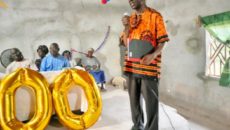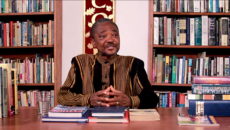Over the past week and a half, my social media feeds have been flooded with pictures and musings from Liberian journalists in the United States, primarily as a result of a meeting of the Association of Liberian Journalists in the United States.
Featuring prominently in this flurry of activity was the attendance of the Press Union of Liberia’s President Abdullai Kamara at the third and final US presidential debate in Las Vegas.
On the surface, this exchange is a great idea. In 2013, Kenya held its first ever presidential debate to great fanfare. I expect a Liberian presidential debate would generate similar excitement if done properly. A presidential debate was held in Monrovia in 2011, although the incumbent failed to attend.
The exchange built on a legacy of US support for PUL. National Endowment of Democracy has provided critical assistance to PUL and the USAID-funded Liberia Media Development program also targets PUL.
Unfortunately for Kamara’s sponsor, the National Democratic Institute, this debate featured Donald Trump, a significant constraint in its utility as an example of democratic discourse. In a previous debate, Trump threatened to jail Hilary Clinton, a reality that many Liberian activists (like Tuan Wreh and Tiawan Gongloe to name a few) have experienced due to their criticism of the state.
I recall the former Minister of Information, Emmanuel Bowier, noting in a speech at the 51st anniversary of the founding of the PUL that “PUL is the most powerful organization in Liberia, it just doesn’t know it yet.†In a rare moment of foresight, the US government seems to recognize this potential, but it’s yet to figure out how best to nurture it.
The Ministry of Information’s line on the Liberian media is paternalistic at best, although it seems to have improved since the departure of former minister Lewis Brown. It’s safe to say the US Embassy feels the same way. Outgoing US Ambassador Deborah Malac penned a patronizing letter to the editors of Front Page Africa last year after she felt an FPA article misquoted her.
Earlier this year, the former US Ambassador to Liberia and the current assistant secretary of state for African affairs, Linda Thomas-Greenfield, visited Monrovia. In a speech at the African Methodist Episcopal University, she said, “You must get away from personality politics. Stress issues. Thus, politicians must stand on platforms and not personalities.â€
Unfortunately, this year’s US presidential election is probably only proving useful to Kamara inasmuch as it showcases the sort of behavior one should seek to avoid.
It is absolutely horrifying that Kamara flew halfway across the world on behalf of NDI to hear Donald Trump announce during the debate that he might not consider the elections results legitimate in the event that he was defeated.
The State Department routinely issues bland press releases (such as this one following Liberia’s 2011 elections) calling on African leaders to respect the rule of law and the will of the people. One of the US presidential nominees, a reality TV show personality, makes it clear that he believes in neither.
The tale of US engagement in Liberia is one of (perceived) good intentions marked by terrible execution. The few thousand emigrants that the American Colonization Society half-heartedly sponsored to cross the Atlantic set Liberia on a turbulent historical path and the US has continued to demonstrate a recurring propensity to screw things up in Liberia.
The US missed a golden opportunity to take a stand in the pivotal 1985 elections by not condemning Samuel Doe’s decision to change his age to be eligible to contest the presidency or the authoritarian actions of his administration that prevented the election from being free and fair. The US Embassy may have thought that amends were made if the allegations that it was responsible for Doe’s death five years later turn out to be true. Unfortunately, the civil war dragged on for more than a decade, with ongoing US involvement.
The PUL President’s presence at a debate where a presidential nominee refused to commit to accepting the results of the election is just the latest, and perhaps one of the most absurd and tragicomic developments from America’s (perceived) good intentions in Liberia going awry.
There have been discussions that Donald Trump’s rise may mark the demise of the Republican Party. Might it also mark the end of America’s standing to lecture Liberia, Africa, and the rest of the world on good governance?
Featured photo by DonkeyHotey



